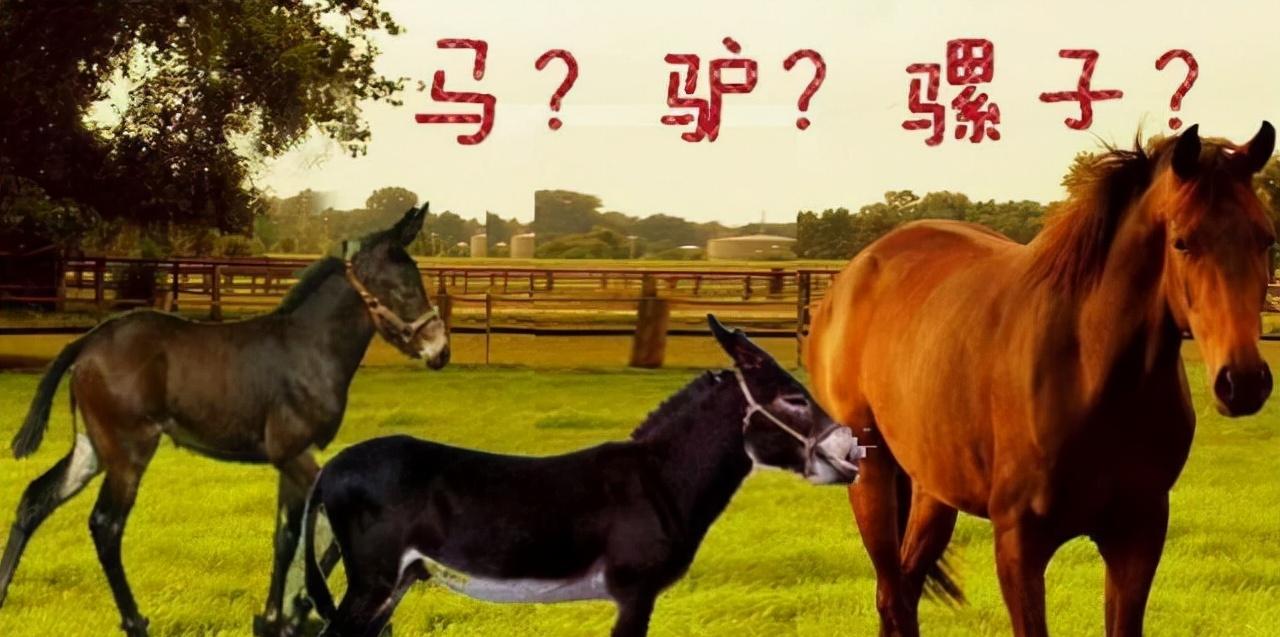The essential reason for the difference in species in organisms in nature is that the genetic material is different. Although there are genetic differences in individuals of the same species, chromosome pairings and quantities are the same, which is a prerequisite for sexually reproducing organisms to be able to reproduce offspring.

<h1 class="pgc-h-arrow-right" data-track="2" > mule germ cell fusion is difficult to produce offspring</h1>
There are very few combinations of different species that can mate and produce offspring, and even if mating is possible, the offspring produced are infertile. However, one species hybrid is the case, and that is the crossbreeding of horses and donkeys to produce mules.
As a hybrid animal, the mule combines the advantages of both a horse and a donkey. Not only is it easy to tame, but it is also more powerful than a donkey and is a practical source of animal power. Half of the mule's chromosomes come from horses and half from donkeys, and because horses and donkeys have different numbers of chromosomes, pairing will result in one more chromosome.
Mules have 63 chromosomes, which prevents them from producing germ cells with the same number of chromosomes. When mules mate with each other, germ cells cannot fuse normally, and naturally they cannot produce offspring. Reproductive isolation exists between species that cannot directly mate to produce fertile offspring, which is the basis for judging whether two individuals belong to the same species.
<h1 class="pgc-h-arrow-right" data-track="16" > the reason why mules can reproduce</h1>
Horses and donkeys are obviously two different species, and there is a comprehensible reproductive isolation between them, but mules are not as infertile as the offspring of ordinary hybrid species, which is the special feature of mules. There have been cases of mules giving birth to mules, which is very rare. Only a specific combination of germ cells can give birth to mule foals.
Since mules are capable of reproducing offspring, does that mean that mules are a fertile animal? There is no clear statement on this issue. Mules are a hybrid of horses and donkeys, and the fertility of mules indicates that the difference between horses and donkeys is small. But horses and donkeys have different numbers of chromosomes, and they are obviously two different organisms.
The reason why the offspring of horses and donkeys can continue to breed may be related to the high degree of chromosome pairing of horses and donkeys. Horses and donkeys are similar in size, similar in size in chromosomes, and have homologous chromosomes, which makes the mule's chromosome combination have a high match.
If there is a suitable combination between the mule's germ cells, it can fuse into a stable fertilized egg. The mule's chromosome pairing is a 32+31 pattern, which produces two germ cells, one with 32 chromosomes and the other with 31 chromosomes. To form a stable fertilized egg, a matching number of germ cells needs to be matched.
For example, the germ cells of 32 chromosomes are paired with the germ cells of 31 chromosomes, and the combination of chromosomes includes a complete set of mule genetic material. Chromosome pairing is relatively easy to achieve, but it is naturally difficult to ensure that it can be fused into a complete set of mule genetic material. So it's rare for mules to give birth to offspring.
<h1 class="pgc-h-arrow-right" data-track="17" > mule breeding has special genetic research value</h1>
The mule's ability to conceive and give birth to a child seems unconscionable to some. In the case of mule reproduction, the mother mule will be executed, which is mainly due to superstitious ideas.
With the improvement of people's cognitive concepts, the situation of mule fertility is no longer viewed as fear. Scientists have shown great interest in the ability of mules to reproduce, a phenomenon that goes against traditional theories and has great genetic research value. However, attempts at artificial breeding all failed.
In order to artificially produce offspring in mules, it is necessary to choose the right combination of mule sperm and egg cells, which requires a certain luck component. Even if mules can reproduce, the probability is too small to be achieved. Hybridization between other species makes it difficult to have a special case like a mule.
The appearance of mules may be more of a coincidence, and it is difficult for horses and donkeys to actively mate and produce offspring under natural conditions. Humans let them mate and reproduce, but also out of the need for production. There are few species differences between horses and donkeys, and they live in similar environments. This, combined with the shorter time it took for the common ancestor to differentiate, made mules significantly different from other hybrid animals.